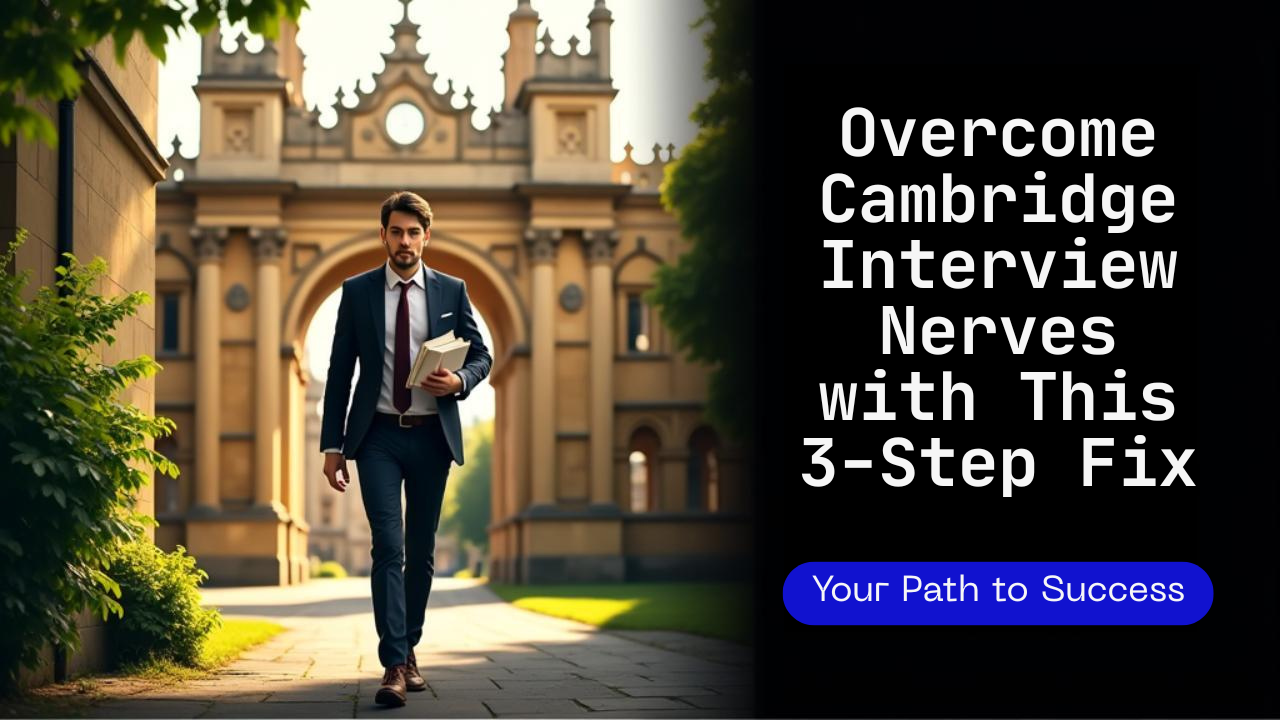This sentiment, shared by countless high-achieving students, reveals a troubling reality about Cambridge interview preparation.
Despite having stellar academic records, brilliant students consistently struggle with Cambridge interviews because they fundamentally misunderstand what’s being assessed.
of Cambridge applicants receive offers
This misunderstanding can devastate years of hard work in a single conversation.
The difference between interview success and failure isn’t about being cleverer or having better grades. It’s about understanding what Cambridge actually wants to see and preparing accordingly.
The Brutal Truth About Cambridge Interview Success
Cambridge interviews serve one specific purpose that most students completely miss. They’re not testing your knowledge—they’re assessing whether you can thrive in Cambridge’s unique tutorial system, where you’ll face intellectual challenges in real-time every week for three years.
This explains why students with perfect A-levels often struggle whilst others with slightly lower grades excel. The interview isn’t about demonstrating what you know; it’s about showing how you think when faced with unfamiliar problems. Cambridge needs students who can engage with complex ideas, adapt their thinking when challenged, and communicate their reasoning clearly under pressure.
The brutal reality is that traditional academic success doesn’t automatically translate to interview success. Many top students have spent years perfecting exam technique and memorising content, but they’ve never developed the intellectual confidence that Cambridge interviews demand.
What Cambridge Interviews Really Test (It’s Not What You Think)
Cambridge interviews assess four core areas that most students never practise. First, they evaluate intellectual curiosity—whether you engage with ideas beyond what’s required and ask meaningful follow-up questions when presented with new information. Second, they test analytical thinking through your ability to break down complex problems systematically, even when you’ve never encountered similar challenges before.
Academic resilience forms the third assessment area. Interviewers want to see how you respond when your initial approach fails and whether you can adapt your thinking based on their guidance. Finally, they evaluate communication skills—not just whether you can explain your reasoning clearly, but whether you think aloud effectively, allowing them to follow your thought process throughout.
These skills are rarely developed in traditional classroom settings, which explains why even exceptional students often feel unprepared. The good news is that these skills can be systematically developed with the right approach.
The 3 Preparation Mistakes That Kill Brilliant Applications
Students spend months memorising extra facts, believing interviews will test knowledge breadth. However, Cambridge interviews deliberately avoid factual recall questions, making this extra content largely irrelevant and often distracting.
Students rehearse answers to questions about motivation and personal interests whilst neglecting the intellectual problem-solving that dominates Cambridge interviews. These conversations spend minimal time on personal statements and maximum time on rigorous academic engagement.
High-achieving students often fear making mistakes, leading them to give safe, conventional answers that fail to demonstrate genuine intellectual curiosity. Cambridge specifically values students who engage with challenging ideas, even when uncertain about outcomes.
The 3-Step Cambridge Interview Success Framework
The most effective interview preparation focuses on developing thinking patterns that Cambridge tutorials require.
Choose challenging problems in your subject and work through them whilst narrating your thought process. This skill proves essential for Cambridge interviews, where silent thinking appears as lack of engagement rather than deep thought.
Regularly expose yourself to academic content slightly beyond your current level, focusing on extracting key ideas and making connections to concepts you understand. Develop the habit of questioning established ideas in your subject area.
Rather than shying away from challenging ideas, embrace intellectual difficulty as Cambridge students must do throughout their studies. Learn to acknowledge uncertainty constructively using phrases like “I’m not certain, but based on these principles, I think…”
Subject-Specific Interview Realities
Science interviews focus heavily on data interpretation and experimental design rather than factual recall. You might be shown a graph of enzyme activity and asked to explain what factors could affect the results, requiring you to apply fundamental principles to unfamiliar situations. Mathematics interviews present problems requiring creative insight rather than standard solution methods, testing your ability to work with abstract concepts and communicate mathematical reasoning clearly.
Humanities interviews emphasise critical thinking and argument construction. You might analyse a primary source you’ve never encountered or discuss broad thematic questions, with interviewers assessing your ability to construct arguments from limited evidence whilst considering multiple interpretations. These conversations require genuine intellectual engagement rather than rehearsed responses.
The key insight across all subjects is that Cambridge interviews test thinking processes rather than knowledge display. Successful candidates demonstrate how they approach unfamiliar challenges rather than showing how much they’ve memorised.
Expert Interview Preparation
Jasper – Jasper graduated from Cambridge with a BA in Computer Science after achieving exceptional A Level results including A* in Mathematics, Further Mathematics, and Computer Science. His experience with competitive programming and systematic problem-solving provides unique insight into technical interview success.
Jasper helps students develop the logical thinking and clear communication skills that technical interviews demand, focusing on problem decomposition and systematic analysis rather than memorised solutions.

Sneha – Sneha graduated from Cambridge with her degree in English Literature after achieving A* in English Literature and strong grades in History and Psychology. Her academic background demonstrates the analytical thinking and textual analysis skills that humanities interviews require.
Sneha specialises in helping students develop the close reading skills and analytical confidence that English interviews demand, teaching students to engage with unfamiliar texts thoughtfully and persuasively.

Experience the Greenhill Academics Difference
Our Cambridge-educated tutors have navigated these exact interview challenges and understand what Cambridge really assesses. They combine deep subject expertise with strategic interview insight to prepare students not just for interviews, but for success in Cambridge’s demanding academic environment.
We don’t just help you practice answers – we develop the intellectual curiosity, analytical thinking, and communication skills that Cambridge interviews reward. Our tutors know how to transform interview anxiety into confidence through systematic preparation that builds genuine understanding rather than rehearsed responses.
Ready to Turn Your Cambridge Interview from Anxiety into Opportunity?
Cambridge interviews don’t have to remain mysterious or terrifying. Our Cambridge graduates know exactly what these interviews assess because they’ve succeeded in the same system you’re entering.
Our one-to-one approach builds confidence through personalised attention and gradual skill development, helping students feel secure to ask questions and take intellectual risks.
Hard work without proper direction can be ineffective. Our tutors identify specific knowledge gaps and provide targeted strategies that make studying more efficient and productive.
We track progress through regular assessments, improved test scores, and increased confidence in subject discussions. You’ll see measurable improvements within the first few sessions.
We cover all major UK exam boards including AQA, Edexcel, OCR, WJEC, and international curricula like IB and Cambridge International.
Sessions are conducted via our interactive platform with shared whiteboards, document sharing, and recording capabilities. It’s as effective as face-to-face tutoring with added convenience.
Most students benefit from 1-2 sessions per week. We’ll recommend the optimal frequency based on your child’s needs, goals, and timeline.
We offer flexible scheduling including evenings and weekends. Our coordinators work with you to find times that suit your family’s routine.
Our tutors are exclusively Oxbridge graduates with proven track records. They combine exceptional academic credentials with genuine teaching passion and undergo rigorous vetting.
Book a free consultation where we’ll discuss your child’s needs, match them with the perfect tutor, and create a personalised learning plan.
